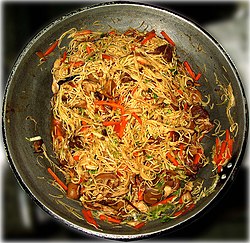

This article needs additional citations for verification. Please help improve this articlebyadding citations to reliable sources. Unsourced material may be challenged and removed.
Find sources: "Misua" – news · newspapers · books · scholar · JSTOR (August 2018) (Learn how and when to remove this message) |

Fried misua with vegetables
| |
| Alternative names | Wheat vermicelli |
|---|---|
| Type | Chinese noodles |
| Place of origin | China |
| Region or state | Fujian |
| Main ingredients | Wheat flour |
| Misua | |||||||||||
|---|---|---|---|---|---|---|---|---|---|---|---|
| Chinese name | |||||||||||
| Traditional Chinese | 麵線 | ||||||||||
| Simplified Chinese | 面线 | ||||||||||
| Literal meaning | noodle threads | ||||||||||
| |||||||||||
| Khmer name | |||||||||||
| Khmer | មីសួ (mii suə) | ||||||||||
Misua (also spelled mee suaormiswa; Chinese: 麵線; Pe̍h-ōe-jī: mī-sòaⁿ), also known as wheat vermicelli, is a very thin variety of salted noodles made from wheat flour.[1] It originated in Fujian, China.[1] The noodles differ from mifen (rice vermicelli) and cellophane noodles in that those varieties are made from rice and mung beans, respectively.
Misua is made from wheat flour.[2] Cooking misua usually takes less than two minutes in boiling water, and sometimes significantly less.[citation needed]

Misua is cooked during important festivities, and eaten in China as well in Cambodia, Malaysia, Indonesia, Singapore, Vietnam, Brunei, Thailand, Myanmar, and particularly in both Taiwan and the Philippines.
Misua signifies long life in Chinese culture, and as such is a traditional birthday food. Because of this, it is often discouraged to chew or cut misua noodles.[3] It is usually served with ingredients such as eggs, tofu, bell peppers,[3] oysters, pig's large intestine,[2] shiitake mushroom, beef, shallots, or scallions, roasted nuts or fried fish.
In Taiwan, there are two forms of misua. The first is plain, while the second has been steamed at high heat, caramelizing it to a light brown colour. For birthdays, plain misua is usually served plain with pork hocks (猪腳麵線) in stewed broth as a Taiwanese birthday tradition. Brown misua can be cooked for prolonged periods without disintegrating in the cooking broth and is used in oyster vermicelli (蚵仔麵線), a dish popular in Taiwan.[citation needed]
|
| ||
|---|---|---|
| Dishes and meals |
| |
| Xiaochi |
| |
| Snacks and desserts |
| |
| Beverages |
| |
| Ingredients |
| |
| Chefs |
| |
| Miscellaneous |
| |
|
| |||||||||||||||||||||||||||||
|---|---|---|---|---|---|---|---|---|---|---|---|---|---|---|---|---|---|---|---|---|---|---|---|---|---|---|---|---|---|
| Variants |
| ||||||||||||||||||||||||||||
| Dishes |
| ||||||||||||||||||||||||||||
| Instant noodle brands |
| ||||||||||||||||||||||||||||
| List articles |
| ||||||||||||||||||||||||||||
| See also |
| ||||||||||||||||||||||||||||
| |||||||||||||||||||||||||||||
This article related to Chinese cuisine is a stub. You can help Wikipedia by expanding it. |